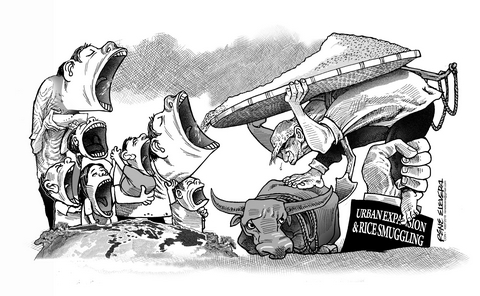
The story of Vicente Isles, an aging farmer based in Sogod town located 61 kilometers north of Cebu City, is one of many that explains why the country continues to suffer from a food crisis that won’t be resolved by palliative measures like legalizing rice smuggling.
Despite their combined meager income Isles and his wife, a teacher, managed to send their five children to school and all have become successful in their own right.
While their success story is something all parents dream of for their children, there is a hint of regret on Isles’ part concerning his one-hectare farm which none of his children would be able to continue since all lead lives that don’t involve farming.
Aside from the country’s woefully bigoted agrarian reform program — the cornerstone to supporting the country’s agricultural sector — past and present administrations have miserably failed to support the nation’s farmers which helps explain why militant leftist groups continue to recruit farmers into their fold.
When we talk of a strong agricultural economy, we don’t just mean plantations planted with every crop imaginable — though that can be visually impressive — but also of farming communities whose residents can not only provide for their own food but sell their crops to neighbors, friends and to anyone willing to buy their own produce.
First World countries don’t have problem-free agricultural economies — climate change and Big Business had seen to it that their farmers also faced their own financial challenges — but they at least provided their farmers with the tools needed to support themselves enough to continue sustaining their farms for several generations.
Governments in socialist and communist countries have collectives in which they mobilize their farmers to plant crops as dictated by their chief agriculture experts that can produce maximum yield and profit for the state while giving a share they deem adequate for their workers.
While a collective may encourage solidarity and a vision of shared survival, it doesn’t instill a sense of self-reliance and independence, of being able to stand on one’s feet that farmers in Western countries have long and continued to enjoy for years.
Sadly that’s not the case for Isles, whose farm may soon be sold or acquired by someone else upon his death.
Inadequate support, the continued decline in farmland caused by aggressive developer expansion and a proposal to legalize rice smuggling have all led to farmers like Isles to dwindle by the numbers and with it, any hope for the country to realize food self-sufficiency.
Disclaimer: The comments uploaded on this site do not necessarily represent or reflect the views of management and owner of Cebudailynews. We reserve the right to exclude comments that we deem to be inconsistent with our editorial standards.




